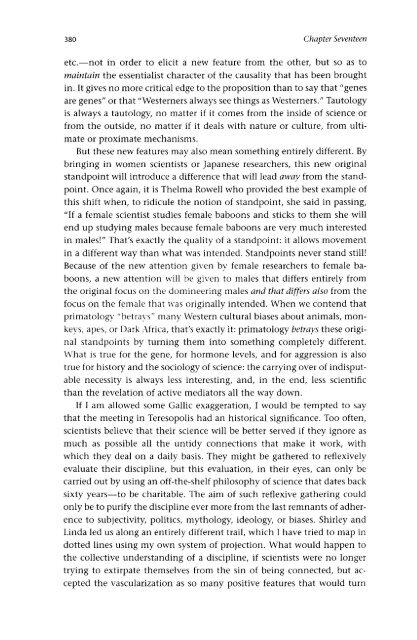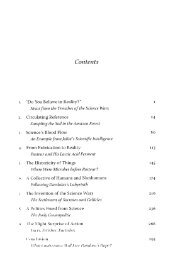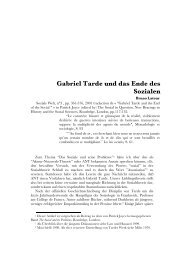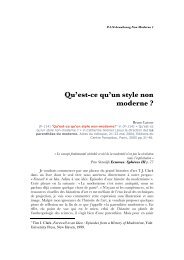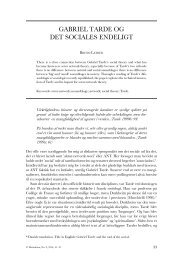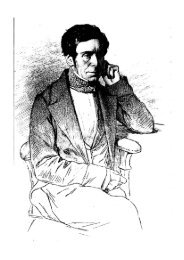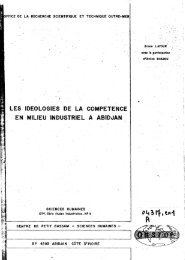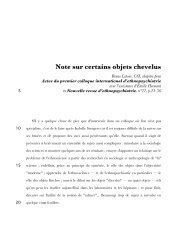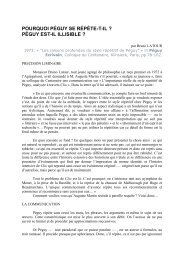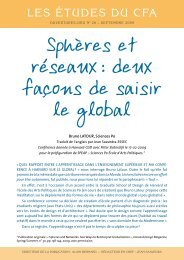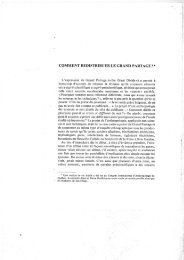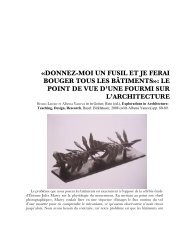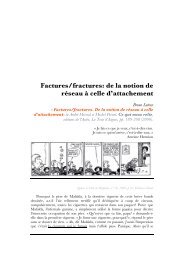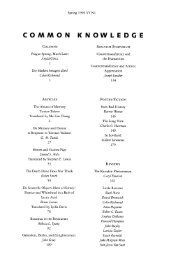A Well-Articulated Primatology - Bruno Latour
A Well-Articulated Primatology - Bruno Latour
A Well-Articulated Primatology - Bruno Latour
You also want an ePaper? Increase the reach of your titles
YUMPU automatically turns print PDFs into web optimized ePapers that Google loves.
380 Chapter Seventeen<br />
etc.-not in order to elicit a new feature from the other, but so as to<br />
maintain the essentialist character of the causality that has been brought<br />
in. It gives no more critical edge to the proposition than to say that //genes<br />
are genes" or that "Westerners always see things as Westerners." Tautology<br />
is always a tautology, no matter if it comes from the inside of science or<br />
from the outside, no matter if it deals with nature or culture, from ultimate<br />
or proximate mechanisms.<br />
But these new features may also mean something entirely different. By<br />
bringing in women scientists or Japanese researchers, this new original<br />
standpoint will introduce a difference that will lead away from the standpoint.<br />
Once again, it is Thelma Rowell who provided the best example of<br />
this shift when, to ridicule the notion of standpoint, she said in passing,<br />
"lf a female scientist studies female baboons and sticks to them she will<br />
end up studying males because female baboons are very much interested<br />
in males!" That's exactly the quality of a standpoint: it allows movement<br />
in a different way than what was intended. Standpoints never stand still!<br />
Because of the new attention given by female researchers to female baboons,<br />
a new attention will be given to males that differs entirely from<br />
the original focus on the domineering males and that differs a/so from the<br />
focus on the fernale that rlas originally intended. When we contend that<br />
primatologl' "betravs" many Western cultural biases about animals, monke1's,<br />
apes, or Dark Africa, that's exactly it: primatology betrays these original<br />
standpoints by turning them into something completely different.<br />
\\hat is true for the gene, for hormone levels, and for aggression is also<br />
true for history and the sociology of science: the carrying over of indisputable<br />
necessity is always less interesting, and, in the end, less scientiflc<br />
than the revelation of active mediators all the way down.<br />
If I am allowed some Gallic exaggeration, I would be tempted to say<br />
that the meeting in Teresopolis had an historical significance. Too often,<br />
scientists believe that their science will be better served if they ignore as<br />
much as possible all the untidy connections that make it work, with<br />
which they deal on a daily basis. They might be gathered to reflexively<br />
evaluate their discipline, but this evaluation, in their eyes, can only be<br />
carried out by using an off-the-shelf philosophy of science that dates back<br />
sixty years-to be charitable. The aim of such reflexive gathering could<br />
only be to purify the discipline ever more from the last remnants of adherence<br />
to subjectivity, politics, mythology, ideology, or biases. Shirley and<br />
Linda led us along an entirely different trail, which I have tried to map in<br />
dotted lines using my own system of projection. What would happen to<br />
the collective understanding of a discipline, if scientists were no longer<br />
trying to extirpate themselves from the sin of being connected, but accepted<br />
the vascularization as so many positive features that would turn


